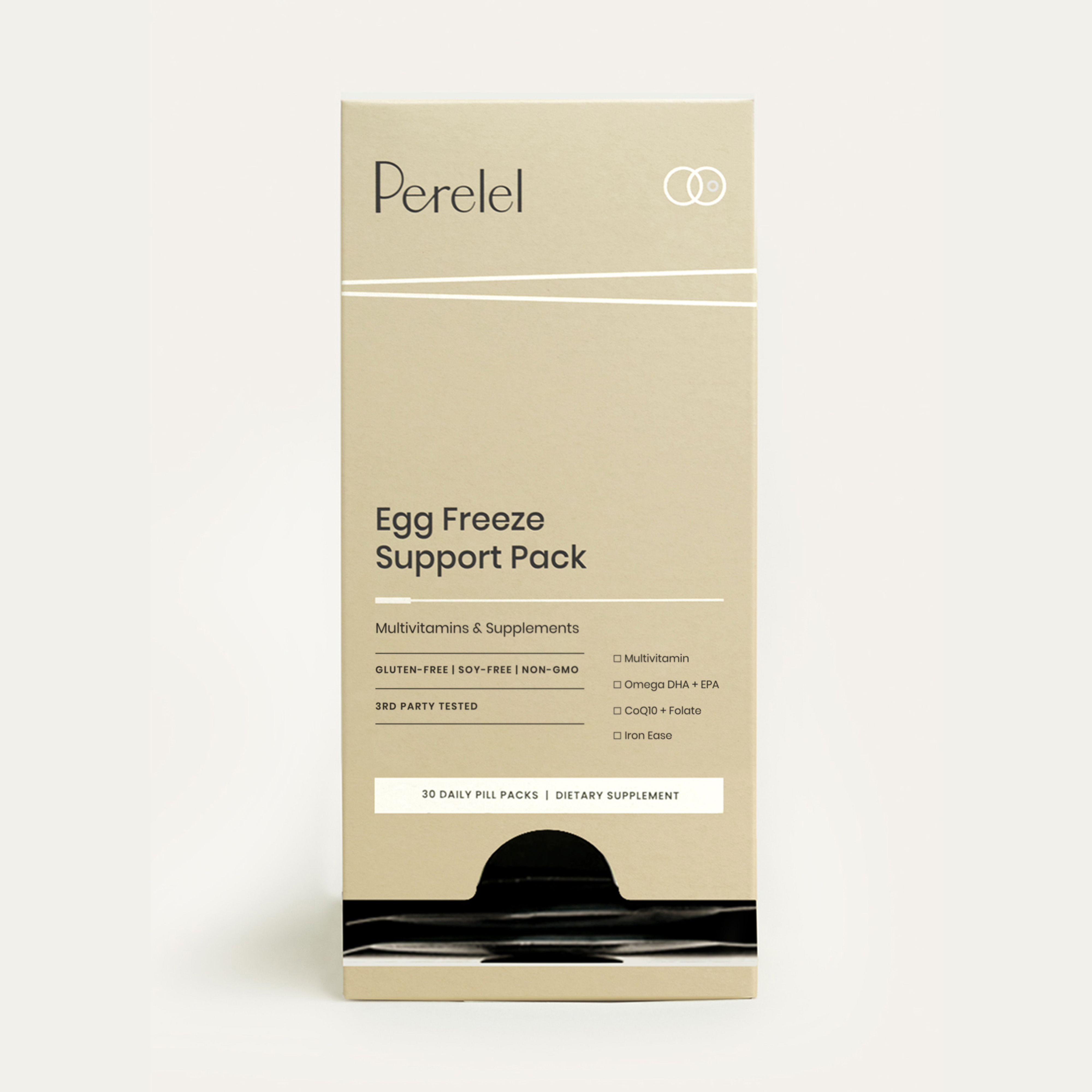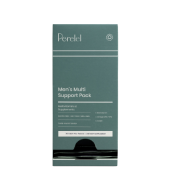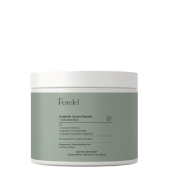By Deanna deBara
If you’re trying to get pregnant, chances are you’re on the look for safe, evidence-based ways to support your fertility journey and increase the likelihood of a positive pregnancy test—and all the joy and excitement that goes with it.
And while there are definite go-tos that have stood the test of time (think prenatal vitamins), every once in a while, a new ingredient or supplement comes along that sets the fertility world abuzz—and right now, that's CoQ10.
Many fertility specialists are raving about CoQ10—and the potential it has to support people on their pregnancy journeys.
But what, exactly, is CoQ10? What role does it play in fertility and reproductive health? And if you decide you want to try CoQ10, how can you incorporate it into your regimen in a way that’s both safe and effective?
What is CoQ10—and what are its benefits?
Before we jump into how CoQ10 impacts fertility, let’s touch on exactly what this ingredient is.
“Coenzyme Q10—CoQ10—is a naturally occurring antioxidant that is essential for the energy production process in cells,” says Dr. Matthew Casavant, board-certified OB-GYN and founder of Florida-based South Lake OB/GYN & Advanced Surgery. “It's found in every cell of the body and is particularly concentrated in the mitochondria, the powerhouse of the cell.”
A powerful antioxidant, CoQ10 supports a number of functions; for example, cardiovascular health, maintaining healthy cholesterol levels, and overall energy levels. Coenzyme Q10 is associated with a variety of health benefits, particularly for those with heart conditions, diabetes, migraines and more.
But one of the most important jobs of CoQ10 is fighting free radicals, particles in the body that can cause serious damage to the cells—including damaging the cell membrane, tampering with DNA, and, in extreme cases, causing cell death.1
“CoQ10 plays a crucial role in generating energy and protecting cells from oxidative damage,” says Casavant. But, as we age, our natural CoQ10 levels decrease—with levels starting to dip after age 20.
How CoQ10 can support fertility
So, we know CoQ10 plays an important role in supporting cell health. But what about its impact on fertility?
CoQ10 can support better fertility outcomes—both for men and women. “For fertility, CoQ10 is believed to improve mitochondrial function, crucial for egg and sperm quality,” says Casavant.
Let’s start with women. As women age, egg volume and quality gradually declines. One of the reasons there are fewer healthy eggs available is a decline in CoQ10 production, which makes it harder for the body to protect the eggs from free radicals—and the oxidative damage those free radicals cause. (Oxidative stress “is a factor in age-related decline in egg quality and quantity,” says Casavant.)
Supplementing with CoQ10 as part of pregnancy pretreatment allows the body to more effectively fight oxidative damage, which can increase both the number of eggs available and the quality of those eggs. (It's why we include CoQ10 in our bestselling Conception Support Pack,* which was specifically formulated to help prepare your body for pregnancy.)2
CoQ10 may also be able to support women going through treatment with assisted reproduction technologies (ART), like in vitro fertilization (IVF) and egg freezing. For example, one study found that women who took CoQ10 supplements had higher pregnancy rates than those who didn’t receive CoQ10.3
Shop the Article:
What about sperm health?
Not only does CoQ10 support egg health, but it can also support male fertility. Up to 80 percent of men have elevated levels of free radicals in their semen, and the damage that causes can lead to things like lower sperm count, decreased sperm quality, even infertility—essentially making the sperm less effective at completing their mission of finding and fertilizing the egg.4
Bottom line? “Individuals experiencing fertility issues, particularly those related to aging—such as decreased egg or sperm quality—may benefit from CoQ10,” says Casavant. It's why the fertility experts on our medical panel opted to include CoQ10 when formulating our Men's Multi Support Pack. (Consider this your friendly reminder that fertility is 50/50.)
When to start taking CoQ10
CoQ10 is one of the most common dietary supplement recommendations for people undergoing fertility treatment, but the earlier you can start, the better. “It’s recommended to start CoQ10 supplements when planning for pregnancy,” says Casavant. If you know you want to have a baby in the future, consider adding CoQ10 supplements now. And if you’re already trying, consider incorporating them as soon as possible. The sooner you take CoQ10, the sooner it can help fight cell damage—which has the potential to increase your chances of getting pregnant.
If you're pregnant or nursing, definitely talk to your doctor. CoQ10 is generally considered safe. But if you’re pregnant or nursing, you’ll want to talk to your doctor before introducing any new ingredients into your routine—including CoQ10. “Women who are pregnant or nursing should consult with their healthcare provider before starting any new supplement,” says Casavant.
What about dosage?
Everyone is different—and, as such, you’ll want to talk to your doctor to figure out the right dose for you. “It's crucial to tailor the dosage and timing to individual health needs under medical supervision,” says Casavant.
Our doctors considered both the latest clinical research and their own patient insights when formulating our suite of fertility products:
- Conception Support Pack*, formulated with ingredients to support egg health and prepare the body for pregnancy, including 50 mg of CoQ10
- Men's Multi Support Pack, formulated with ingredients to support his general and reproductive health, including 50 mg of CoQ10
- Egg Freeze Support Pack*, formulated with ingredients to support your egg freezing journey, including 50 mg of CoQ10
- Fertility+ Support*, an antioxidant booster formulated to layer with our Conception Support Pack, for those fertility journeys that may need additional support (like those over 35, those who have been trying to conceive for over six months, or those who have an inflammatory condition)—which includes 100 mg of CoQ10
It’s also worth noting that, while CoQ10 shows serious promise in supporting fertility, it’s by no means a magic bullet. CoQ10 can be a part of your fertility plan—but if you’re trying to get pregnant (or want to get pregnant in the future), you’ll want to have the other elements of the plan (like diet and exercise) in place as well. “ should be part of a comprehensive approach to fertility that includes diet, lifestyle changes, and medical treatments if necessary,” says Casavant. “It's important to have a personalized plan created in partnership with a fertility specialist.”
References:
- Coenzyme Q10.
- Pretreatment with coenzyme Q10 improves ovarian response and embryo quality in low-prognosis young women with decreased ovarian reserve: a randomized controlled trial.
- Does coenzyme Q10 supplementation improve fertility outcomes in women undergoing assisted reproductive technology procedures? A systematic review and meta-analysis of randomized-controlled trials.
- Coenzyme Q10 and Male Infertility: A Systematic Review.

























